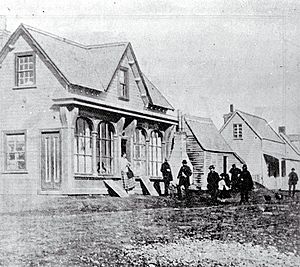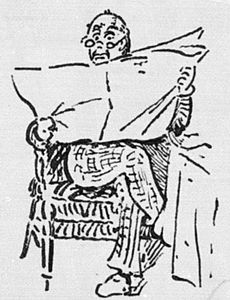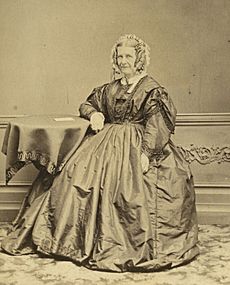Joseph Brittan facts for kids
Quick facts for kids
Joseph Brittan
|
|
|---|---|
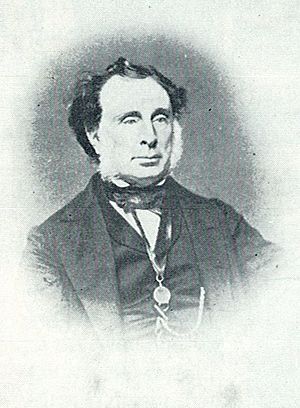
Portrait of Joseph Brittan
|
|
| Provincial Secretary of the Canterbury Provincial Council | |
| In office May 1855 – February 1857 |
|
| Preceded by | John Hall |
| Succeeded by | Richard Packer |
| Canterbury Provincial Council | |
| In office March 1855 – July 1857 |
|
| Majority | elected unopposed |
| In office August 1861 – September 1862 |
|
| Personal details | |
| Born | 12 January 1806 Bristol, England |
| Died | 27 October 1867 (aged 62) Christchurch |
| Spouses | Elizabeth Mary Brittan (née Chandler; d. 1849) Sophia Brittan (née Chandler; m. 1851, d. 1877) |
| Relations | Guise Brittan (brother) William Rolleston (son in law) Frank Rolleston (grandson) John Rolleston (grandson) |
| Children | Mary Rolleston |
| Residence | Linwood House |
| Occupation | Surgeon, newspaper editor, farmer, politician |
| Profession | Surgeon |
Joseph Brittan (born 12 January 1806 – died 27 October 1867) was an important person in early Christchurch, New Zealand. He was a surgeon, a newspaper editor, and a politician. Joseph Brittan moved to Christchurch from England in February 1852 with his wife and four children. He followed his younger brother, Guise Brittan, who had already settled there.
Joseph Brittan quickly became involved in many activities. He bought land and started a farm. His home, Linwood House, gave its name to the Linwood suburb. The Brittan family were strong Anglicans and were close to the local church. Joseph Brittan's daughter, Mary, later married William Rolleston, who became a leader in Canterbury.
Brittan was a member of the Canterbury Provincial Council for over three years. He served as the Provincial Secretary from 1855 to 1857. He also started the Canterbury Standard newspaper, which was the third newspaper in Canterbury. Joseph Brittan was known as a great speaker, but he could also be sharp and sarcastic. He faced health issues and financial worries later in life. He passed away at his home in October 1867.
Contents
Early Life and Journey to New Zealand
Joseph Brittan was born in Bristol, England, on 12 January 1806. His family was middle-class, and his father was a brewer. Joseph Brittan had seven children with his first wife, Elizabeth Mary Chandler. Sadly, three of their children died very young. His wife also passed away in 1849. The children who survived were Joseph (Joe), Arthur, Elizabeth Mary (Mary), and Frances (Frank).
Brittan later married his first wife's sister, Sophia. This marriage was not allowed in England at the time. They decided to get married in Gretna Green, Scotland, where it was legal. After their wedding, they decided to move to New Zealand. They sailed on a ship called the William Hyde in October 1851. Joseph's younger brother, Guise Brittan, had already moved to Christchurch.
During the long journey, Joseph Brittan worked as the ship's surgeon. He even helped put on a play, The Merchant of Venice. He invited women to act in the play, which was very unusual back then. The ship arrived in Lyttelton on 5 February 1852. Most new arrivals had to sleep in tents. However, the Brittans were lucky because Guise Brittan had arranged a house for them in Christchurch. To reach Christchurch, they had to walk over the Port Hills on a steep path called the Bridle Path. They carried their belongings, but it was hard after months at sea.
Starting a New Life in New Zealand
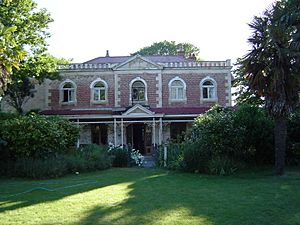
When Joseph Brittan arrived, Christchurch was a very small settlement with only about 140 buildings. There were already two doctors, so Brittan didn't need to work as a surgeon. Instead, he became interested in buying and selling land, like his brother. He bought a large piece of land, about 50 acres, along the Avon River. He later bought more land, bringing his total property to about 110 acres.
Brittan turned his land into a farm. He set aside 10 acres for his home, a garden, and an orchard. He named his property Linwood, after a place he had lived in England. Linwood House was finished in 1857, and the family moved there. Next to his farm was Holy Trinity Avonside, a church where his brother Guise was involved. The Brittan family had a strong connection to this church. Joseph Brittan helped raise money for its building, and his daughter Mary sang in the choir.
The Brittans loved music. Sophia played her piano, which they brought from England. Joseph played a portable harmonium. He even joined a music group in Lyttelton, which was a more important cultural center than Christchurch at the time. He would walk over the Bridle Path with his instrument on his back. They also held musical evenings at their home.
Joseph Brittan enjoyed sports. He played cricket in Hagley Park soon after arriving. He also helped improve the park and raise money for fences. He was interested in horse racing and even bred horses. He hosted Canterbury's first steeplechase race on his Linwood farm.
Running a Newspaper
Before moving to New Zealand, Joseph and Guise Brittan owned a newspaper in England. Joseph continued this work in New Zealand. He started, owned, and edited the Canterbury Standard newspaper. The first issue was published on 3 June 1854. It was the third newspaper in Canterbury.
Brittan was also part of a group that tried to take over another Christchurch newspaper, The Press, in 1862. He was strongly against building a Lyttelton Rail Tunnel to connect Christchurch and Lyttelton. The Press also opposed this tunnel, which was why Brittan was interested. For a time, Brittan even became the acting editor of The Press. In 1866, the Canterbury Standard was sold to The Press and stopped being published.
Getting Involved in Politics
New Zealand held its first elections in 1853. There were two levels of government: a national House of Representatives and local Provincial Councils. Brittan first ran for public office in 1855. He wanted to join the Canterbury Provincial Council. He was elected without opposition for the Town of Christchurch area.
In May 1855, the leaders of the Provincial Council resigned. James FitzGerald, the first Superintendent (leader) of the Canterbury Province, asked Brittan to form a new group of leaders. Brittan became the Provincial Secretary. When FitzGerald was away in 1856, Brittan took his place as acting Superintendent. Brittan resigned as Provincial Secretary in February 1857 but stayed on the Provincial Council until July 1857.
The Great Tunnel Debate
Many people thought Brittan would become the next Superintendent after FitzGerald. However, William Sefton Moorhouse also ran for the position. Moorhouse was less experienced than Brittan and not as good a public speaker. But Moorhouse strongly supported building the Lyttelton Rail Tunnel, which would connect Christchurch and Lyttelton by train. Brittan was against this tunnel.
The tunnel became the main issue of the election. Moorhouse received a lot of support, especially from people in Lyttelton. Even though both candidates got the same number of votes from Christchurch residents, Moorhouse won the election by a large margin. He later started the tunnel project in 1861.
Brittan was re-elected to the Provincial Council in 1861 and again in 1862. However, he resigned in September 1862 due to his declining health. The loss of his son earlier that year also played a part. William Wilson, who later became the first Mayor of Christchurch, publicly thanked Brittan for his years of service. In 1863, Brittan was appointed a resident magistrate for Christchurch and Kaiapoi. But his health problems meant he had to resign after only nine months.
Family Life and Legacy
Joseph Brittan had six children with his first wife. Two of them died as young children in England. His surviving children were Joseph (Joe), Arthur, Elizabeth Mary (Mary), and Francis (Frank) Henry. His three sons all attended Christ's College.
Tragedy struck the family on 1 January 1862. His son Arthur drowned in the Avon River while learning to swim. He got caught in watercress, which the Brittans had actually brought to the river. It took a long time to find his body. Joseph Brittan was heartbroken by this loss and may have gone through a period of sadness.
In 1865, William Rolleston proposed to Mary Brittan. He was 34, and she was 19. Joseph and Sophia Brittan were against the marriage. They thought Rolleston was too old for Mary, and that Mary was too young to marry. Despite their parents' objections, Mary and William got engaged. They were married on 24 May 1865 at Avonside Trinity Church.
Joseph Brittan's health got worse in 1867. He suffered from frequent headaches and gout. He also had financial worries, which made him irritable. Joseph Brittan died on 27 October 1867 at Linwood House. He was buried at Holy Trinity Avonside next to his son Arthur. His wife Sophia was buried near him when she passed away in 1877.
A Lasting Impact
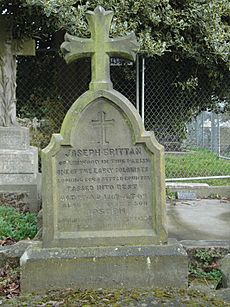
People remembered Joseph Brittan as a very able man and a skilled speaker. However, his sharp and sarcastic way of speaking made some people fear or dislike him. His obituary said he was one of the best speakers in the Provincial Council.
Brittan Street in Christchurch was named after him. Linwood House, his former home, was recognized as a heritage building. Sadly, it was badly damaged in the 2010 and 2011 Christchurch earthquakes. It had to be torn down in 2011.


